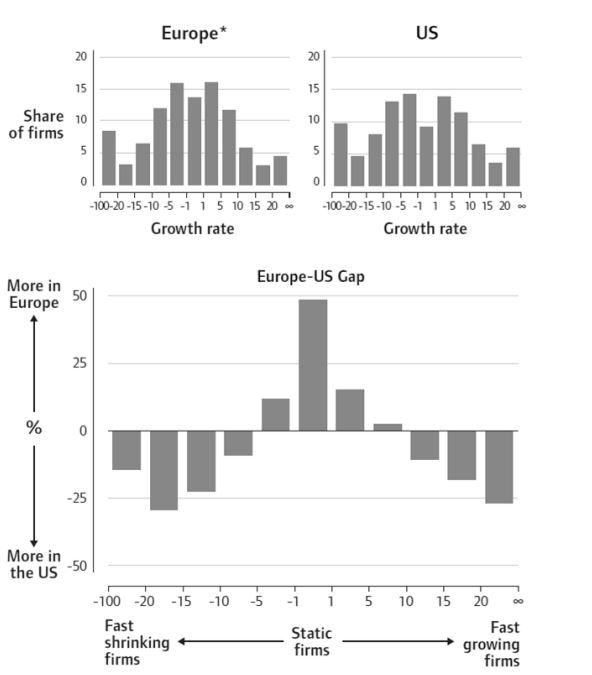Start-ups and other small innovative companies, including those developed by digital entrepreneurs, play an important role in energizing the business environment, but they often face many institutional barriers. This is especially true in Europe, where policies and attitudes seem frozen in time. Hurdles include limited access to finance, regulatory complexity, the availability of important skills, and a policy-making process that seems biased toward established and large firms. Companies must overcome these challenges to build the sustainable competitive advantage that is crucial for success in the fast-moving digital world. If nothing changes, many of these new ventures will fail outright, find it impossible to grow beyond the borders of their home country, or be taken over by larger (often non-European) companies. Unless steps are taken, Europe will miss the benefits to the economy and society from the new wave of information and communication technology (ICT).
New ICT Firms Struggle to Grow in Europe
A critical difference between the EU and US economies is that the latter has created several large-platform ICT businesses with global reach. The EU has seen very few, if any, of these enterprises, and the region tends to be home to large and/or longstanding firms. While several national economies in Europe come close to the United States in enterprise creation, far fewer EU firms grow beyond the small and medium enterprise (SME) category to create sustained growth. There is also generally more dynamism in business growth and decline in all sectors of the US economy, not just in ICT. As in the United States, the few big-hitter start-ups in Europe are digital (e.g., the game and application producers Mind Candy, Miniclip, and Shazam). This suggests Europe struggles to with the growth of these businesses rather than their creation. A recent study of the dynamism of business in the United States and Europe [I] found that a much higher proportion of US firms grow or decline quickly, while a higher proportion of European firms are more or less static. Surprisingly, this includes businesses in the digital space.
Share of Firms by Growth Bracket, Europe-United States comparison

Source: What Drives the Dynamics of Business Growth?
Recommendations for Support ICT in Europe
The EU and its member countries need to address the factors restraining the impact of ICT on business and the economy. Necessary changes include encouraging sufficient investment in top-class infrastructure. Policy makers and business leaders should seek to energize businesses through product and labor market flexibility, access to finance, and reduced red tape. The complexity of existing regulations and uncertainty about future rules are a major concern, especially for small companies that may find the cost of compliance prohibitive. An increased willingness to embrace new technologies and change in general is also critical. Smaller firms require increased access to funding and supportive regulation to build a workforce that possesses the skills it needs. This is especially critical when talented workers can easily move across borders. Indeed, for innovative and potentially riskier small initiatives, it may be difficult to find funding to create, experiment, and grow. In Europe, the stigma attached to failure often damages entrepreneurial dynamics, especially since many successful companies have followed a string of initial “failures.” Successfully addressing these barriers is an important first step to encourage the growth of new businesses and innovation.
Interested in learning more about digital entrepreneurship in the EU? Read Closing the Digital Entrepreneurship Gap in Europe: Enabling Businesses to Spur Growth from The Conference Board from Tony Clayton and Desiree van Welsum.
[I] Albert Bravo-Biosca, Chiara Criscuolo, and Carlo Menon, “What Drives the Dynamics of Business Growth?” OECD Science, Technology and Industry Policy Papers, No. 1, OECD Publishing, 2013.
The Brookings Institution is committed to quality, independence, and impact.
We are supported by a diverse array of funders. In line with our values and policies, each Brookings publication represents the sole views of its author(s).



Commentary
Closing the Digital Entrepreneurship Gap in Europe: Enabling Businesses to Spur Growth
April 8, 2014